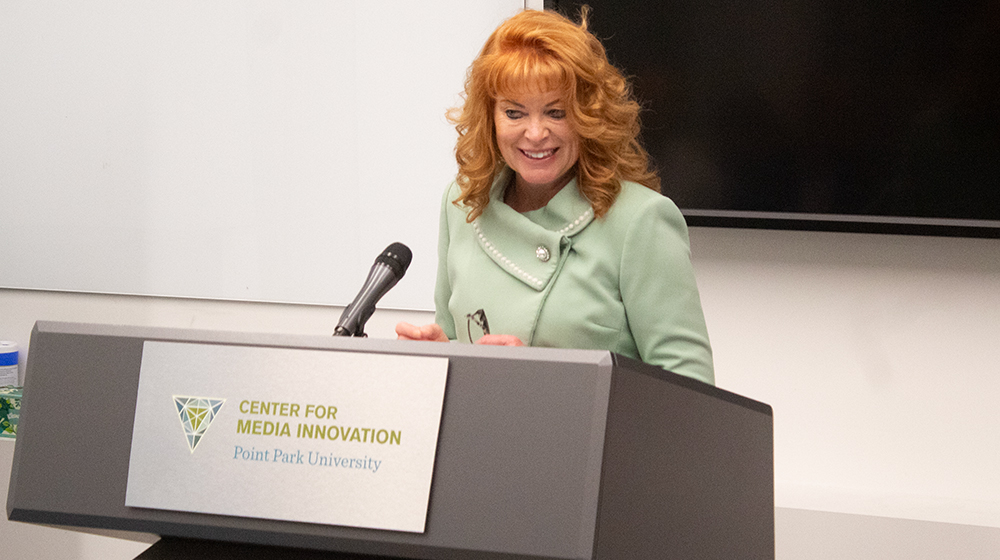PA Treasurer Announces Major Milestone for College Savings Program Thursday, October 10, 2024

Photo by Benjamin Parry '27
“At Point Park University, we recognize that college affordability is a critical issue facing students and families today. We’re committed to making higher education accessible through various financial aid options and initiatives.”
Point Park University recently hosted Pennsylvania Treasurer Stacy Garrity and representatives of Neighborhood Allies to celebrate more than $100 million saved by Keystone Scholars families in companion PA 529 College and Career Savings Program accounts. Garrity made the announcement at Point Park's Center for Media Innovation.
“Keystone Scholars is designed to encourage families to save early for education, and today’s announcement shows that it’s working,” Garrity said. "Saving early and often will really pay off when a child picks their career path, no matter where it leads."
Keystone Scholars automatically provides a $100 education investment for every baby born to, or adopted by, a Pennsylvania family since January 1, 2019, using no taxpayer money. A child can use their account and its growth after their 18th birthday to pay for technical, collegiate and apprenticeship expenses.
Research shows that children with even a modest amount of savings for education are three times more likely to attend a two- or four-year postsecondary institution, and four times more likely to graduate.
Marlin Collingwood, vice president of enrollment management, expressed his enthusiasm for the Keystone Scholars program. “At Point Park University, we recognize that college affordability is a critical issue facing students and families today. We’re committed to making higher education accessible through various financial aid options and initiatives. Aiding families with long-term planning is also crucial and 529 college savings plans are an important part of that planning. Keystone Scholars is doing great work to encourage early saving and make college a reality for more students.”
Collingwood shared that when he interacts with prospective families, he will often hear them say, “We wish we’d saved.” However, even for those that haven’t saved, a Point Park education can still be surprisingly affordable.
This fall, 99% of incoming first-year students received financial aid with an average assistance package of $32,095.
Part of that award might include the Visit Scholarship of $4,000 over four years to any high school student who visits campus before matriculating. “We want young people to have the opportunity to envision themselves on a four-year college campus,” Collingwood said.
Neighborhood Allies, a Pittsburgh organization with a goal of moving 100,000 low-income Pittsburghers up the socio-economic ladder over the next 10 years has created the Fund My Future PGH program to motivate families to save for their child’s education.
“Over the past ten years, we have helped nearly 6,000 families open [education savings] accounts and make regular deposits,” Toni Corinealdi, senior program manager of empowerment and outreach at Neighborhood Allies said. “Our goal is for every child in Allegheny County to have their own savings account by the time they start school.”
Some people are surprised to learn that a private institution such as Point Park educates so many low-income students. Currently, 44% of the student population is eligible for the Federal Pell Grant, which is offered only to students who display exceptional financial need.
Other affordability initiatives at Point Park include:
- The Bison Book Bundle, which is a program that provides all required course materials on a rental basis for a flat fee, reducing textbook expenses by an estimated 40 percent.
- Monthly payment plans over nine or 10 months.
- Student employment options include state and federal work-study positions, apprenticeships, international student employment and other employment opportunities.
A College Education is Within Reach
Contact the financial aid office for more information about the affordability of a Point Park education.

